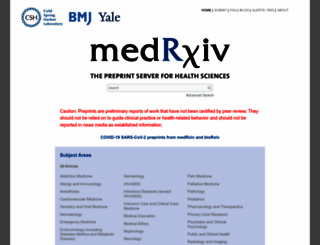medRxiv.org - the preprint server for Health Sciences
Page Load Speed
1.1 sec in total
First Response
85 ms
Resources Loaded
929 ms
Page Rendered
122 ms

About Website
Click here to check amazing Medarchive content. Otherwise, check out these important facts you probably never knew about medarchive.org
medRxiv - the preprint server for Health Sciences, operated by Cold Spring Harbor Laboratory, a research and educational institution
Visit medarchive.orgKey Findings
We analyzed Medarchive.org page load time and found that the first response time was 85 ms and then it took 1.1 sec to load all DOM resources and completely render a web page. This is quite a good result, as only 20% of websites can load faster.